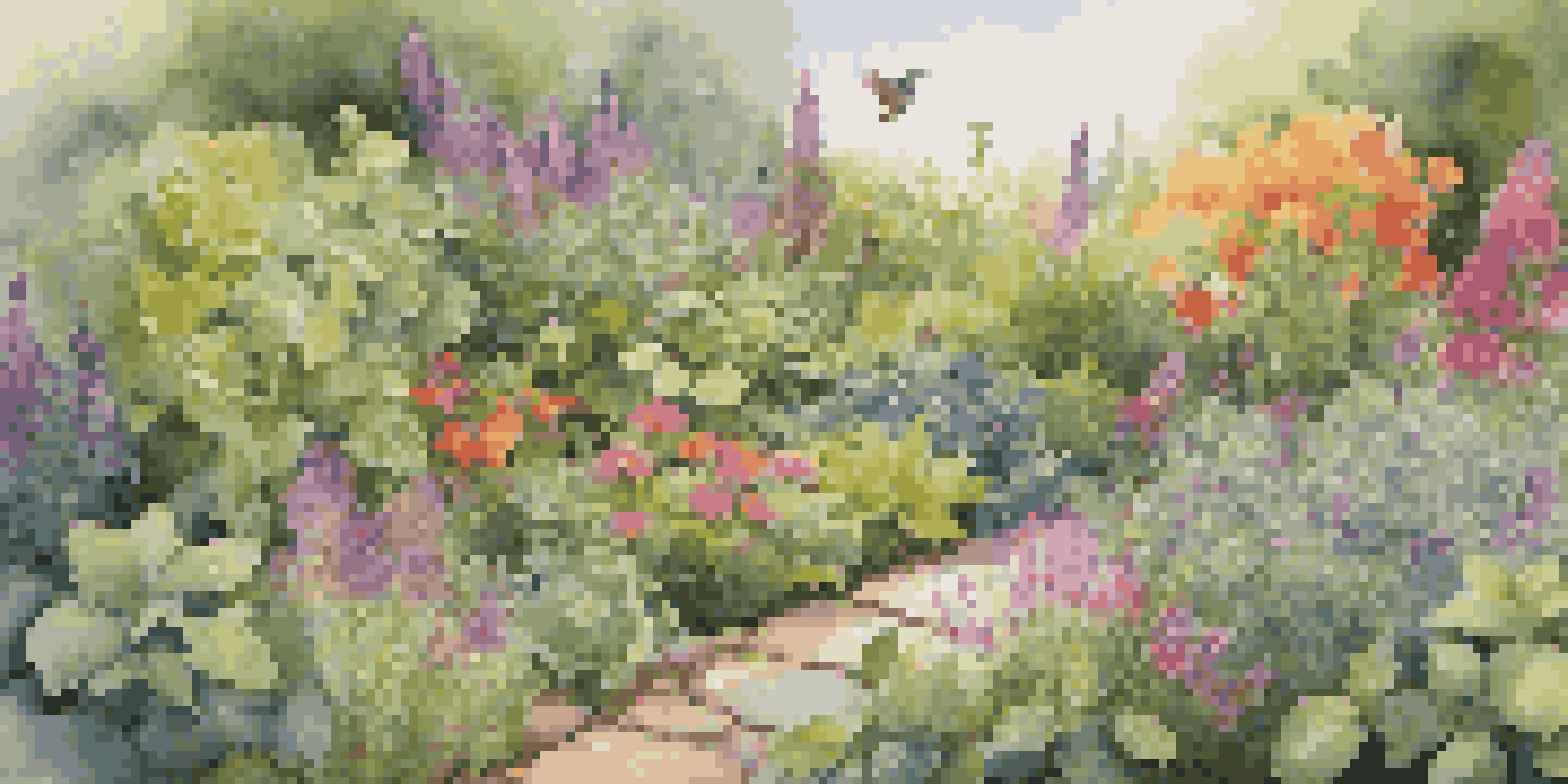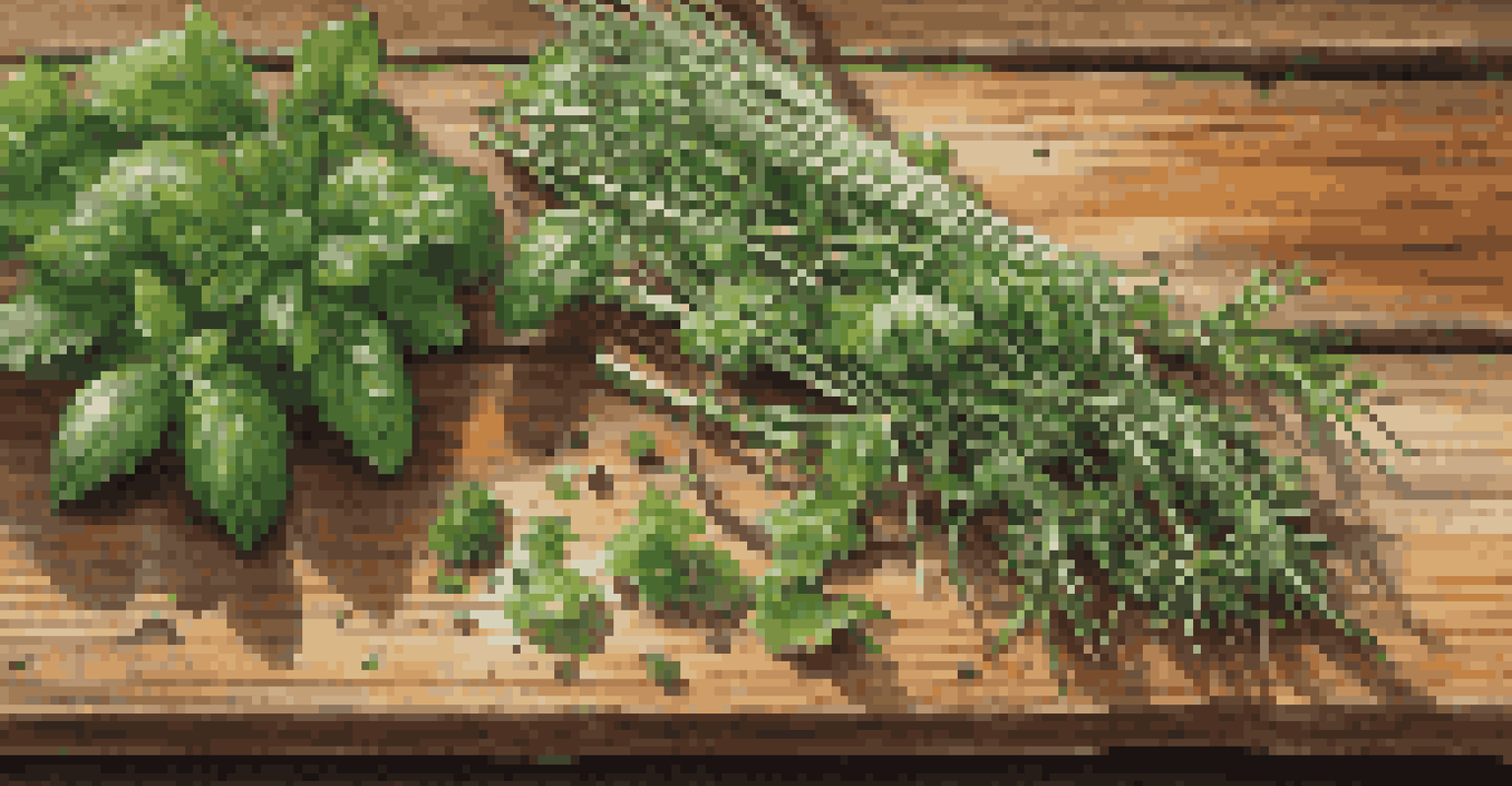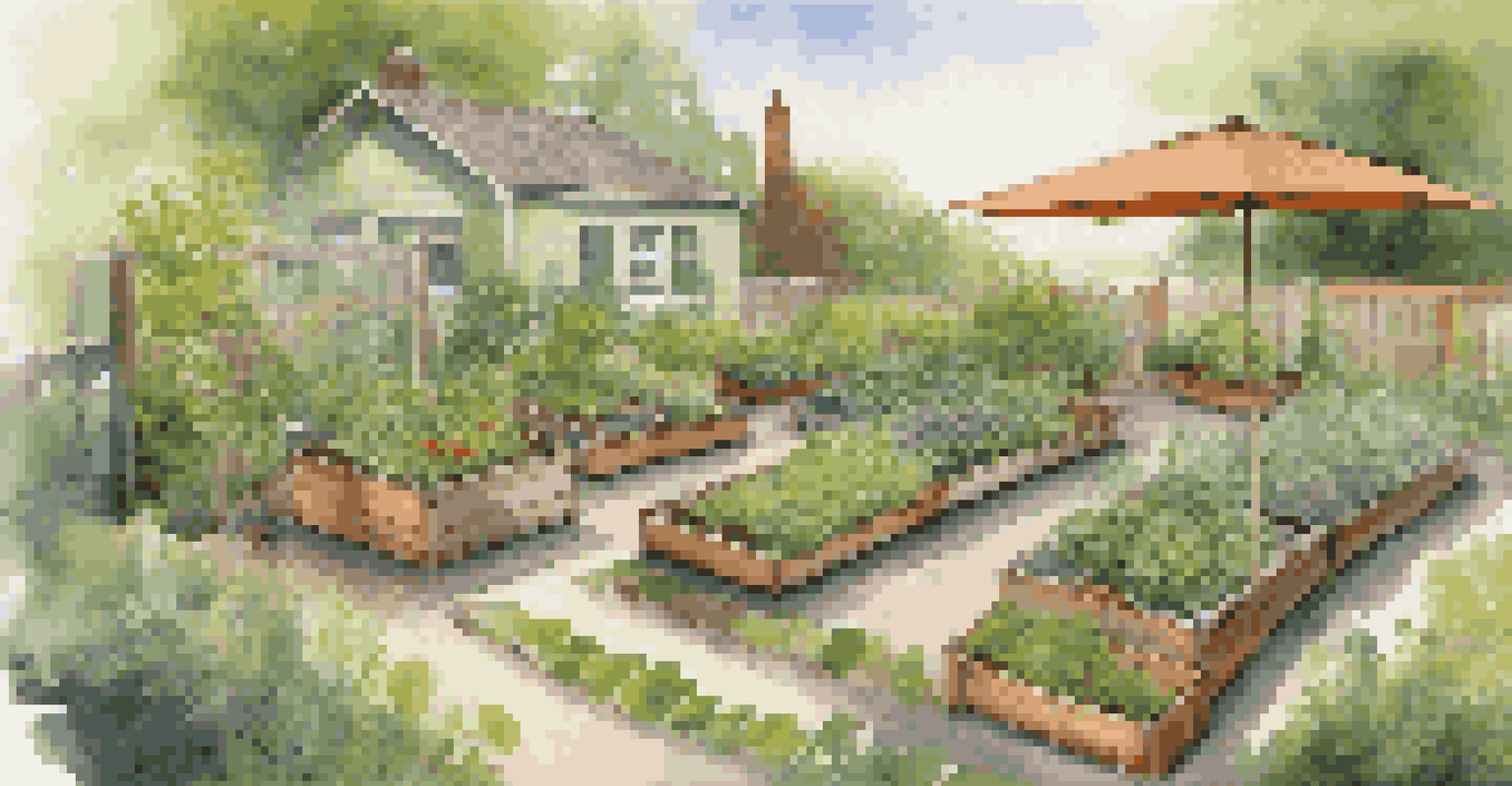Gardening with Herbs: Supporting Wildlife and Human Health

Understanding the Importance of Herbs in Gardening
Herbs are not just culinary delights; they play a crucial role in gardening. They enhance the flavor of our meals while providing essential nutrients for wildlife. By incorporating herbs into our gardens, we create a vibrant ecosystem that supports birds, bees, and other beneficial creatures.
Herbs are the spice of life.
For instance, plants like basil and oregano attract pollinators, which are vital for the growth of fruits and vegetables. This symbiotic relationship between herbs and wildlife showcases how even small plants can have a big impact on our environment. Ultimately, growing herbs can lead to a healthier garden and a healthier planet.
Moreover, herbs can improve soil quality and reduce pests naturally, creating a more resilient garden. By choosing to grow herbs, gardeners contribute to biodiversity, which is essential for sustaining life on Earth. So, let’s celebrate the humble herb and its many contributions to our gardens and ecosystems.
Creating a Wildlife-Friendly Herb Garden
Designing a wildlife-friendly herb garden is simpler than it sounds. Start by selecting a variety of herbs that are native to your area, as they are better suited to attract local wildlife. Popular choices include thyme, chives, and mint, which not only flourish but also provide shelter and food for various creatures.

Adding elements like rocks, logs, or water features can further enhance the habitat. These features offer resting spots for insects and small animals, creating a lively atmosphere in your garden. Plus, the diversity of plants and structures invites more wildlife, contributing to a balanced ecosystem.
Herbs Boost Biodiversity in Gardens
By planting a variety of herbs, gardeners can attract diverse wildlife, promoting ecological balance and resilience.
Remember, a wildlife-friendly garden doesn’t have to be perfect. Embrace a bit of untidiness, as it often encourages birds and beneficial insects to visit. By allowing nature to take its course, you’ll find that your herb garden can thrive while supporting local wildlife.
The Health Benefits of Growing Herbs
Growing herbs doesn’t just benefit wildlife; it’s also a boon for human health. Fresh herbs are packed with vitamins, antioxidants, and essential oils that can enhance our well-being. For example, rosemary has been shown to improve memory and concentration, while mint can aid digestion.
The earth laughs in flowers.
Adding herbs to your diet is an easy way to elevate the nutritional value of your meals. A sprinkle of fresh basil or cilantro can transform a dish, making it not only tastier but also healthier. This simple practice encourages more home-cooked meals, which are often healthier than pre-packaged options.
Moreover, gardening itself has therapeutic benefits. Spending time in nature, tending to plants, and enjoying the sensory experience of herbs can reduce stress and promote overall mental health. So, whether you’re snipping herbs for dinner or simply enjoying their fragrance, your garden can significantly contribute to your well-being.
Herbs as Natural Pest Deterrents
One of the great advantages of growing herbs is their ability to deter pests naturally. Many herbs, like lavender and sage, emit strong scents that repel unwanted insects. This natural pest control can reduce the need for chemical pesticides, making your garden safer for both wildlife and humans.
Incorporating pest-repelling herbs into your garden can also create a more balanced ecosystem. For instance, planting rosemary near vegetables can protect them from beetles, while attracting beneficial insects that prey on pests. This approach fosters a harmonious environment where plants and wildlife coexist.
Herbs Enhance Culinary Experiences
Growing your own herbs allows for fresh, flavorful ingredients that can transform everyday meals into culinary delights.
Additionally, this method of pest management aligns with organic gardening principles, promoting sustainability. By harnessing the power of herbs, gardeners can protect their crops while minimizing environmental impact. So, consider adding these fragrant defenders to your garden for a healthier and more productive space.
The Role of Herbs in Biodiversity
Herbs play a vital role in promoting biodiversity within our gardens. By planting a variety of herbs, we can attract different species of insects, birds, and other wildlife. This diversity is crucial for maintaining ecological balance and resilience against diseases and pests.
For example, a garden filled with a mix of herbs like dill, parsley, and chamomile can attract various pollinators and beneficial insects. This diversity not only helps in pollination but also ensures that there are natural predators available to keep pest populations in check. In essence, a diverse herb garden is a thriving ecosystem.
Moreover, fostering biodiversity is essential for our food systems. Diverse plant life can improve soil health and increase resilience to climate change. By choosing to grow a variety of herbs, we contribute to a healthier environment and food supply for ourselves and future generations.
Herbs for Culinary Adventures at Home
Herbs are the secret weapon in any home cook's arsenal. They can elevate simple dishes into culinary masterpieces with just a sprinkle. Whether it's a dash of fresh thyme on roasted vegetables or a handful of cilantro in a salsa, herbs can transform flavors and inspire creativity in the kitchen.
Growing your own herbs provides a constant supply of fresh ingredients at your fingertips. Imagine stepping into your garden to pick vibrant basil for a homemade pesto or fragrant mint for a refreshing tea. This connection to your food not only enhances your meals but also brings a sense of accomplishment.
Natural Pest Control with Herbs
Many herbs have pest-repelling properties, allowing gardeners to reduce reliance on chemical pesticides and create a healthier garden.
Additionally, the culinary uses of herbs extend beyond just flavor. Many herbs, like garlic and turmeric, have health benefits that can contribute to overall wellness. By experimenting with different herbs, you can explore new tastes while nurturing your body with nutritious ingredients.
Sustainable Gardening Practices with Herbs
Practicing sustainable gardening with herbs is a rewarding endeavor. It involves using methods that respect the environment while still providing for our needs. Techniques like composting, mulching, and crop rotation can enhance soil health and reduce waste, creating a thriving garden ecosystem.
By growing herbs, you can also reduce your carbon footprint. Instead of buying herbs from the store, which often have a long transport journey, growing your own means fresher ingredients and less environmental impact. Plus, herbs require less space and resources than traditional crops, making them an ideal choice for sustainable gardening.

Incorporating sustainable practices not only benefits the environment but also fosters a deeper connection to nature. As you nurture your herb garden, you’ll learn to appreciate the delicate balance of ecosystems and the importance of biodiversity. This holistic approach to gardening can lead to healthier plants and a healthier planet.